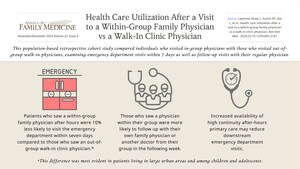ANN ARBOR, Mich., April 11, 2023 /PRNewswire/ -- A new study published in the Annals of Family Medicine has found that the presence of a community support person during labor reduces the likelihood of obstetric racism experienced by Black patients during hospitalization for labor, birth and immediate postpartum.
Thirty-seven Black cisgender women with a prior hospitalization of labor, a live birth, and immediate postpartum during one continuous episode of care, participated in in-person, qualitative focus groups. Eight hundred and six additional participants completed online surveys. Participants shared birthing experiences across 348 hospitals from Washington, D.C. and 34 states in the United States.
Using the PREM-OB Scale™, researchers measured three domains of obstetric racism: humanity (violation of safety and accountability, autonomy, communication and information exchange, and empathy); kinship (denial or disruption of community and familial bonds that support Black birthing people); and racism in the form of anti-Black racism and 'misogynoir' (i.e., weaponization of societal stereotypes and scripts in service provision that reproduce gendered anti-Black racism in the hospital).
Participants then documented whether they were accompanied by a community support person, which researchers defined as an individual present throughout labor, birth and postpartum care and with no hospital affiliation.
Researchers found that scores across all three domains of obstetric racism were higher in the group where no community support person was present. Additionally, their analysis found a greater decrease in disruption of kinship with the presence of a community support person during childbirth hospitalization.
Published during Black Maternal Health Week in the U.S. (April 11-17, 2023), the paper's findings suggest an increasing need for Black birthing communities, hospitals, health plans, quality improvement and implementation scientists, as well as community advocates, to recognize the added value of community support persons throughout the Black birthing experience.
"As physicians whose ethics of care prioritize patient, family and community health and well–being, we strongly believe family medicine physicians can utilize their voice and power to activate and amplify the agency and self–efficacy of Black birthing people in choosing the type and number of people they desire and deserve to be present with them during childbirth hospitalization" the authors write.
Presence of Community Support Persons During Black Birthing Experiences is Associated with Less Obstetric Racism. Elle Lett, Marie-Fatima Hyacinthe, Dána-Ain Davis, Karen A. Scott
SOURCE Annals of Family Medicine

WANT YOUR COMPANY'S NEWS FEATURED ON PRNEWSWIRE.COM?
Newsrooms &
Influencers
Digital Media
Outlets
Journalists
Opted In






Share this article